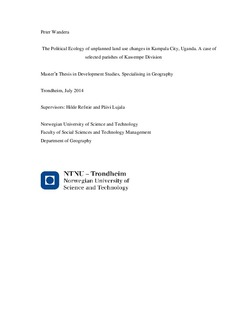| dc.description.abstract | Kampala City is undergoing massive unplanned urban land use changes caused by political, social, economic and environmental push and pull factors. Both local and transnational companies are rapidly locating in Kampala due to its emerging markets for produced goods and services, cheap labor costs, tax holidays offered by the government to encourage foreign investments and other economies of scale. Furthermore, rural-urban migration and high birthrates result in rapid urban population growth which influences the land use in the area. Increasing demand for urban land has led to land scarcity and maximum utilization of any available land.
This thesis aimed at exploring unplanned land use changes in some parishes of Kawempe Division in Kampala. The objective was to show how land use has changed in these areas over time, the causes of such changes and the perceptions of unplanned land use changes by various stakeholders. This was done using a multiple methods approach involving GIS, a survey and structured interviews with various stakeholders. The thesis made use of theories within the framework of Political Ecology (PE) to analyse historical, environmental, social, economic and political factors influencing land use and perceptions of land use change.
The study found that land use change in the area was changing in unplanned manner leading to incompatible land use activities in the study area. Wetlands and swamps in the area had for example been increasingly settled, both informally by the urban poor and formerly by industrial and commercial actors. This was seen as problematic in several ways. One is environmental degradation of the wetlands and swamps which are meant for conservation and biodiversity. Another is the risks people who have settled there face in terms of environmental hazards such as flooding, sanitation and disease outbreaks. When it rains for example, the low lying areas, swamps and wetlands flood something that leads to health problems, poor solid waste management thus raising safety and health concerns. Nevertheless, many urban poor see no other alternative than settling in low lands with wetlands and swamps to keep close to the city, commercial and industrial centres where they work. Most people in the study area cannot afford plots of land through the formal land acquisition system. They have therefore created informal settlements and developments where every kind of activity is mixed together on extremely small pieces of land as people try to maximize land use. This has led to tension and social stress between people living in the informal settlements and government agencies such as vi the National Environment Management Authority (NEMA) charged with protecting ecological and conservation areas in the country. At the same time, commercial and industrial developers are also increasingly building in the area often disregarding existing Physical Development Plan (PDP) and other land use plans such as detailed plans by Kampala Capital City Authority (KCCA). Both informal and formal land use activities are enabled and supported by political interests, favors and corruption that undermine the implementation of urban land use policies, laws and bylaws thus resulting into unplanned land use changes.
The unplanned land use change was perceived differently by the local community and the technocrats responsible for urban planning. People settled in the area did not see the unplanned land use change as problematic. Where there were issues, they blamed the local government for not priotizing resources to deal with water, sanitation and waste in the area. In many ways this reflected a concern with the more “brown agenda” in urban planning. The technocrats on the other hand saw the unplanned land use change as very problematic particularly in terms of environmental damage. This point to the wider discussion around on what considerations should take priority and if there were ways for the brown and green agenda to be reconciled when dealing with unplanned land use change. | nb_NO |
